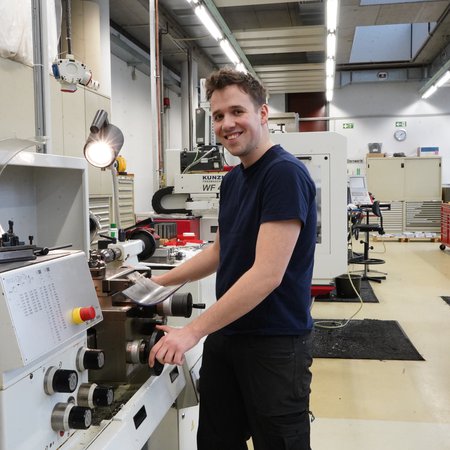Prof. Dr. Karl-Heinz Rädler (1935-2020)
The Leibniz Institute for Astrophysics Potsdam (AIP) mourns the loss of Prof. Dr. Karl-Heinz Rädler. On the 9th of February, 2020, he passed away at the age of 84. As the founding director of the AIP and Chairmen of the board from 1992 to 1998, Karl-Heinz Rädler made a significant contribution to the establishment of the institute and development as an internationally recognized research center for astrophysics.
In the 1970s, Karl-Heinz Rädler was able to explain the creation of magnetic fields in stars and planets with the dynamo model. He was also significantly involved in the theoretical preparation of earth-based experiments with liquid sodium, in which it was possible to understand the principle of the cosmic dynamo for the first time. His work was known worldwide during his time as a scientist at the Central Institute for Astrophysics in the GDR. From 1992 to 2000 he headed the Cosmic Magnetic Fields branch at the AIP and was editor of the Astronomische Nachrichten magazine.
In 1998 Karl-Heinz Rädler received the Emil Wiechert Medal from the German Geophysical Society, which honors outstanding work in the scientific discipline of geophysics. The Urania Potsdam also awarded him the Wilhelm Foerster Prize in 1998 for his popular scientific achievements. In 2013, he received the Karl Schwarzschild Medal of the Astronomical Society, the highest award for astronomical research in Germany.
From 1994 to 2000 Karl-Heinz Rädler was a professor at the University of Potsdam. He was also a member of the founding senate of the European University Viadrina in Frankfurt (Oder).
We will remember his commitment to our institute with thanks.
Our condolences go to his family, friends and all who were close to him.
The Leibniz Institute for Astrophysics Potsdam (AIP) mourns the loss of Prof. Dr. Karl-Heinz Rädler. On the 9th of February, 2020, he passed away at the age of 84. As the founding director of the AIP and Chairmen of the board from 1992 to 1998, Karl-Heinz Rädler made a significant contribution to the establishment of the institute and development as an internationally recognized research center for astrophysics.
In the 1970s, Karl-Heinz Rädler was able to explain the creation of magnetic fields in stars and planets with the dynamo model. He was also significantly involved in the theoretical preparation of earth-based experiments with liquid sodium, in which it was possible to understand the principle of the cosmic dynamo for the first time. His work was known worldwide during his time as a scientist at the Central Institute for Astrophysics in the GDR. From 1992 to 2000 he headed the Cosmic Magnetic Fields branch at the AIP and was editor of the Astronomische Nachrichten magazine.
In 1998 Karl-Heinz Rädler received the Emil Wiechert Medal from the German Geophysical Society, which honors outstanding work in the scientific discipline of geophysics. The Urania Potsdam also awarded him the Wilhelm Foerster Prize in 1998 for his popular scientific achievements. In 2013, he received the Karl Schwarzschild Medal of the Astronomical Society, the highest award for astronomical research in Germany.
From 1994 to 2000 Karl-Heinz Rädler was a professor at the University of Potsdam. He was also a member of the founding senate of the European University Viadrina in Frankfurt (Oder).
We will remember his commitment to our institute with thanks.
Our condolences go to his family, friends and all who were close to him.
Images
Prof. Karl-Heinz Rädler.





